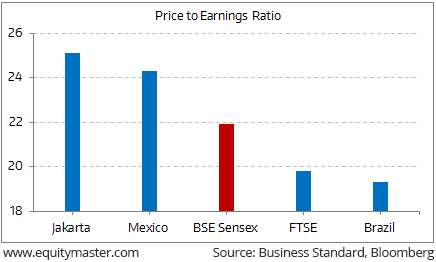- Home
- Todays Market
- Indian Stock Market News April 18, 2017
Sensex Finishes in Red; Realty Sector Tanks 3.8% Tue, 18 Apr Closing
Indian share markets trimmed their morning gains and finished in red due to heavy selling in realty stocks and metal stocks amid mixed global cues.
At the closing bell, the BSE Sensex stood lower by 95 points, while the NSE Nifty finished down 34 points. Meanwhile, the S&P BSE Mid Cap and the S&P BSE Small Cap finished down by 0.6% and 0.7% respectively.
Indian markets are hovering around all-time high. On a price to earnings ratio comparison, the Sensex is placed third when it comes to most expensive emerging markets in the world.
India - The Third Most Expensive Emerging Market
The global markets are up due to increase in capital inflows. For instance, FII flows into India since January totaled Rs 437 billion. This clearly shows the current buoyancy is a result of global liquidity i.e. flowing money into the emerging markets.
With economy struggling on many fronts, the valuations look unsustainable, unless there is an earnings recovery soon.
Asian stock markets finished mixed as of the most recent closing prices. The Nikkei 225 gained 0.35%, while the Hang Seng & the Shanghai Composite fell 1.39% and 0.79% respectively. Meanwhile, European markets too were trading in red as uncertainty hung over the looming first round of France's presidential election.
The rupee was trading at Rs 64.57 against the US$ in the afternoon session. Oil prices were trading at US$ 52.67 at the time of writing.
United Breweries share price and United Spirits share price fell around 3% and 2.6% respectively as liquor baron Vijay Mallya has been arrested in London.
The World Bank in latest report has stated that India's GDP is expected to see uptick from 6.8% in 2016-2017 to 7.2% by current fiscal year and rise further to 7.5% in 2018-19 fiscal. It also forecasted that India's economic growth will rise slowly to 7.7% in 2019-2020 supported by a recovery in private investments.
It noted that the economic growth slowed down to 6.8% in 2016-17 on the back of weak investments and the impact of demonetization. It also stressed that the GDP slowed to 7% during the third quarter of 2016-17, from 7.3% during the first half of the fiscal.
According to the report, the significant risks to economic growth could derive from fallout of note ban on small and informal economy, stress in the financial sector along with uncertainty in global environment. It also pointed out that a rapid hike in the prices of oil and other commodities could have a negative implication for the economy. However, it suggested that timely and smooth implementation of the GST could prove to a significant uptick risk to economic activity in 2017-18.
The report further said that India's fiscal, inflation and external conditions are expected to remain stable. It also said that the center will continue to consolidate modestly, while retaining the push towards infrastructure spending.
It also added that challenges to India's favorable growth outlook could stem from continued uncertainties in the global environment, including rising global protectionism and a sharp slowdown in the Chinese economy, which could further delay a meaningful recovery of external demand.
In news from PSU sector, the government will sell stakes in seven blue-chip state-run companies, including Indian Oil Corp and Steel Authority of India, as it looks to raise cash to fund its ambitious infrastructure and social projects.
It also intends to offload 15% equity in Neyveli Lignite Corporation (NLC). Moreover, the government intends to sell 10% stake each in NHPC, NTPC and Power Finance Corporation (PFC).
As per reports in a leading financial daily, the finance ministry invited merchant banks and legal advisers to help with the share sales that are also crucial for the government to meet the fiscal deficit target of 3.2% of GDP in 2017-18. The government aims to raise Rs 725 billion from disinvestment during the period.
Reportedly, the government has struggled to raise enough private money, with at least Rs 650 billion worth of road projects stuck because of difficulty in obtaining land. Many power projects remain unfinished owing to regulatory delays.
PSU stocks finished on a mixed note with REC share price and Coal India share price leading the losses.
Meanwhile, Raymond share price surged 13% in today's trade after it was reported that the company is planning to raise Rs 1.5 billion through issuance of non-convertible debentures (NCDs) on private placement basis.
Moving on to news from IT sector. TCS has received its shareholders' approval for Rs 160 billion share buyback plan. The buyback program, which was passed through a special resolution, saw 99.81% of the total number of valid votes being cast in favor of the proposal.
The proposed shares under the buyback represent 2.85% of the total paid up equity share capital at Rs 2850 per equity share. In February, the board of TCS had approved the proposal to buy back up to 56.1 million equity shares for an aggregate amount not exceeding Rs 160 billion.
Last week, Infosys announced its capital allocation policy to return up to Rs 130 billion this financial year through dividend and/or buyback.
Earlier this year, Cognizant announced a US$3.4 billion share buyback, bowing to pressure from activist investor Elliott Management Corp.
TCS share price finished the day down by 0.5% ahead of TCS' fourth quarter and full fiscal (2016-17) results, scheduled to be announced today.
For information on how to pick stocks that have the potential to deliver big returns, download our special report now!
Read the latest Market Commentary



Equitymaster requests your view! Post a comment on "Sensex Finishes in Red; Realty Sector Tanks 3.8%". Click here!
Comments are moderated by Equitymaster, in accordance with the Terms of Use, and may not appear
on this article until they have been reviewed and deemed appropriate for posting.
In the meantime, you may want to share this article with your friends!